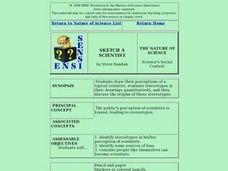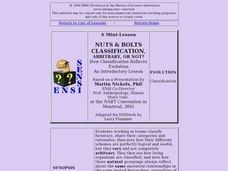Curated OER
Making a Karst Dictionary
Young scholars practice using the correct vocabulary in geology and hydrology. They use the Internet to research topics and practice their researching skills.
Curated OER
13 Ways to Tell Time Backwards
Students explore different ways geological time can be measured: comparing the time dimensions for each method, the mechanisms of each method, and the materials used.
Curated OER
Why Don't Whales Have Legs?
Students are given a variety of materials and are asked to design a heat loss experiment that results in a reasonable explanation of "Why don't whales have legs?" students work with the theory of natural selection.
Curated OER
Sketch a Scientist
Students draw their perceptions of a typical scientist, evaluate stereotypes in their drawings quantitatively, and then discuss the origins of these stereotypes.
Curated OER
Date a Rock!
Students figure the number of half-lives since the sample solidified, and therefore the "age" of the sample rocks.
Curated OER
Cladistics Is a Zip...Baggie
Students explore how the grouping of organisms based on their shared derived characters forms the basis of a cladogram.
Curated OER
Nuts & Bolts: is Classification, Arbitrary, Or Not?
Students, in groups, classify furniture, share their categories and rationales, then note how their different schemes vary, perfectly logical and useful, but completely arbitrary.
Curated OER
Contrivances: Orchids and the Panda's Thumb
Students read and discuss selected and edited excerpts from the essays of Stephen Jay Gould on the subject of contrivances.
Curated OER
What Can Pseudogenes Tell Us About Common Ancestry?
Students compare/constrast DNA sequence data for a portion of the rat GULO gene to the corresponding sequence in the inactive GULO gene in humans, chimpanzees, orangutans, and crab-eating macaques by identifying the shared sequences in...
Curated OER
Bryant Creek Watershed Project - Making a Karst Dictionary
Students explore the definitions relevant to Karst topography. They develop a Bryant Watershed Dictionary of the special words and terms that are used to talk about the topography and hydrology of the area they live in.
Curated OER
The Flat Earth
Students are first presented with the idea that the Earth is really flat. They prove that it is not--using a variety of techniques.
Curated OER
W.A.R. (Wars Are Real)
Eighth graders research America's involvement in wars and conflicts throughout its history. They are assigned a specific war or conflict and then research basic facts and what society was like in the era of their research. They present...
Curated OER
Chromosome Fusion
Students see how patterns can reveal events of the past, thereby merging elements of both experimental and historical science.
Curated OER
NOAA Research Project
Young scholars research any topic relating to the National Oceanic and Atmospheric Administration (NOAA) research cruise that Mrs. Richards be participating in.
Curated OER
A Crime Against Plants
Students research the phenomenon that is living in a small tree. They develop their own conclusion on what they believed is occuring. They answer discussion questions to end the lesson.
Curated OER
Find the Washer
Learners examine a closed box with wires and try to guess where the washer is. They experiment by pulling out wires to determine the location of the washer. They complete discussion questions to end the lesson plan.
Curated OER
Three-Hole Bottle
Students participate in an experiment with a 2-liter bottle. They develop their own hypothesis about what they believe will happen when certain items are tested on the bottle. They discuss results.
Curated OER
The Great Volume Exchanger...or the Magic Matter Maker ®
Students pour water into a "magic" box and examine how it comes out with a much larger volume of water. They, working in small groups, design a volume exchanger and explain its design to the whole class.
Curated OER
Palpating Pachyderms: How Do We Interpret Observations?
Students interpret a poem before completing activities to distinguish observations and interpretations. They examine how personal background can influence how a person interpreters what they observe.
Curated OER
Blocks And Screws (or "screwy Contrivances")
Students, given a block of wood and a screw or nail, are asked to put that screw or nail into a block. They examine how many contrivances and other imperfections found in living things are best explained by the process of evolution.
Curated OER
Why Do We Need Vitamin C in Our Diet?
Students compare/contrast the DNA sequence data of the rat GULO gene to the inactive human GULO gene. They translate and align the sequences, and propose a scenario to explain the occurrence of an inactive DNA sequence to that of an...
Curated OER
Global Studies Religion Fair
Students review the major religions of the world. Using the internet, they research the impact of religions and the development of the area in which they originated. They work together to create a museum display and brochure showing...
Curated OER
Water Quality of Local Lakes
Learners research the quality of water in a regional lake of West Bloomfield in the past and present. They compare conditions of the lake, past and present. They then give examples of local and regional human activities that may have had...
Curated OER
Definition and Applications of Computational Science
Students participate in a variety of instructional experiences about Computer Science. They define Computational Science and describe computational simulation. They also compare and contrast Computational Science and Computer Science.

























